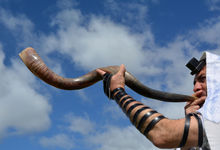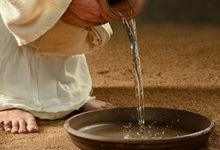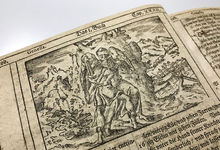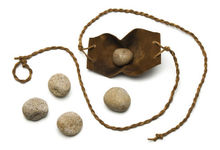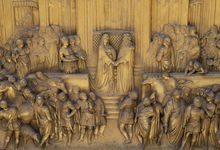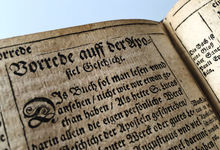The victory dance of a prominent woman
She was much more than an anonymous secondary character in the Bible—to this day, Judaic tradition regards Miriam, the dancing prophetess, as a positive and important woman. And this despite the fact that she lived in a time when the world was ruled by men.

It was around 1300 bc. The Egyptian Pharaoh and his military forces had resolved to pursue Moses and the people of Israel—and a decisive event occurred at the Sea of Reeds: the people of Israel gained their freedom and finally set out on their long-anticipated homeward trek to Jerusalem. So great was the longing for home, and so powerful the inner emotion, that Miriam picked up a timbrel and began to sing a hymn—her hymn: “Sing to the Lord, for He has triumphed gloriously! The horse and its rider He has thrown into the sea!” (Exodus 15: 21). This text is ancient and quite short in length, yet its words speak volumes with regard to cultural history! Miriam sang to Israel from her soul. The way back to Jerusalem was important, existentially vital for the people! This was a hymn of praise to the one true God!
Miriam, a gift of God
And as the elder sister of Moses and Aaron, its singer was an acknowledged leadership figure. The fact that she is mentioned in Holy Scripture in the first place attests to her extraordinary talent: she is described as a prophetess. This already assured her of a prominent position among the people, and her apparently competent nature conferred a good reputation upon her as well
Normally, women in the world of the Orient played a rather subordinate role. The society was patriarchal, and it discriminated among people on the basis of gender, age, money, religion, ethnicity, and above all, the legal status of the free and the unfree. The free had personality rights, while the unfree were slaves and thus nothing more than a commodity. Miriam was a prophetess, a gift of God to His people and, as a result, she was practically untouchable. As a prophetess, she felt herself directly moved by the Spirit of God. She had to do what needed to be done: her hymn of praise reminded the people of what was really worth praising and glorifying: not their own strength, but rather God alone!
Miriam, a stubborn prophetess
There was also another side to Miriam—hence her name, which is derived from the Hebrew and means “the unruly one”. Prophetesses of her calibre were not satisfied with a particular state of affairs just because the majority had no objections. Her task was to put her finger right into the wound.
The opening verses of Numbers 12 relate the following: “Then Miriam and Aaron spoke against Moses because of the Ethiopian woman whom he had married; for he had married an Ethiopian woman.” The two siblings ganged up on Moses. After all, he had married a foreigner, which must have been quite an affront at that time. This—coupled with an ambitious desire to share in the leadership role that had been assigned to Moses—was the issue that drove Miriam to chastise her brother. She was a somebody, after all! But things turned out very differently. The prophetess had forgotten that it is God who sets the standards, not His servants.
The realm of the prophetic often goes hand in hand with criticism and calls for change. However, it also leaves room for uncertainty, unpredictability, and ambiguity. Prophets can be obstinate and uncooperative!
For seven days she was compelled to do penance, having been afflicted with leprosy and cast out of the camp—a hefty punishment for the erstwhile songstress. But she managed to make her way back and accept the decision of God. Even Moses prayed for her: “Please heal her, O God, I pray!” She remained a woman no one wanted to do without. In the end there was solidarity with God’s prophetess.
Miriam, a woman with an opinion of her own
It seems that the Bible does not have much to say about Miriam. But what it does say is enough to let us see that she was a high-ranking personage. It even tells us where she was buried. It was apparently assumed that her grave might one day become a place of pilgrimage. Seen in hindsight, she was an indispensable figure in the constantly shifting fortunes of the people of Israel: as a prophetess, she was sent by God. As a sister to Moses and Aaron, she actively intervened in their leadership role. And as an offender put into her place by God, she shines as an example in obedience and suffering. Her story reminds us that it was both men and women who led the nation of Israel to liberty.
And her eponymous song has made her immortal. It has endured through the centuries to attest of her strength and courage. With her hymn of praise to God, the true ruler of heaven and earth, an intelligent, headstrong, and deeply believing woman has sent us an echo that still resounds in our time. She sings and dances for us.
Photo: michaeljung - stock.adobe.com









